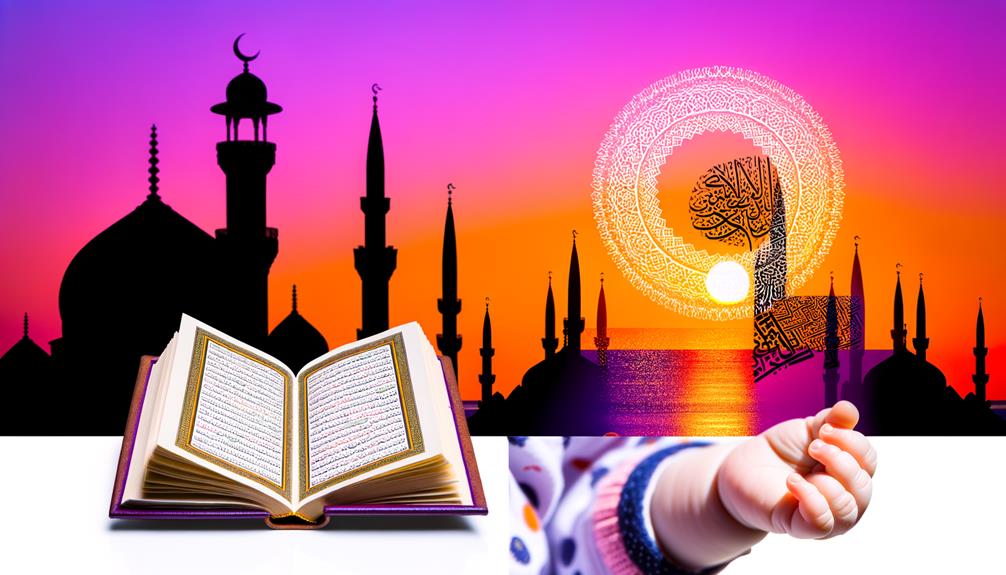Muslim Name Meaning in Arabic
Muslim names in Arabic carry deep meanings and spiritual connections. They're chosen for their virtues, aspirations and religious significance, influencing a child's character and destiny.
Popular names such as Muhammad, Amina, or Yusuf convey religious beliefs, historical figures, and cultural values. Muhammad signifies 'praiseworthy', Amina denotes 'trustworthy', and Yusuf means 'God will add'.
Remember, these meanings are just the tip of the iceberg. There's much more to discover about the history, cultural significance, and religious influence tied to Arabic Muslim names.
You're about to unfold a world rich in tradition, faith, and symbolism. Travel further and you'll realize their depth.

Key Takeaways
- Muslim names often carry deep spiritual meanings, reflecting virtues, religious beliefs, and cultural values.
- The structure of Arabic names, including 'Ism', 'Nasab', 'Nisbah', and 'Laqab', adds depth to their meanings.
- Names like 'Muhammad', 'Aisha', and 'Yusuf' are popular due to their significant meanings in the Muslim faith.
- Quranic figures, virtues, and attributes of Allah heavily influence the meanings of Muslim names.
- The cultural significance of Muslim names reflects individual identity, heritage, and religious beliefs.
Understanding the Structure of Arabic Names
To truly grasp the meaning behind Muslim names, it's imperative for you to understand the unique structure of Arabic names. Typically, an Arabic name consists of several parts: the 'Ism' (personal name), the 'Nasab' (patronymic name), the 'Nisbah' (reflecting tribal or geographical affiliation), and the 'Laqab' (nickname or honorific).
The 'Ism' is what you'd call a first name, the 'Nasab' often traces lineage, the 'Nisbah' indicates ties, and the 'Laqab' can be a personal attribute or achievement. Importantly, not every Arabic name contains all these elements. This intricate structure contributes to the depth and richness of Muslim names.
Understanding this provides a foundation for deeper exploration of the meanings and significance of these names.
Significance of Names in Islam
Diving into the significance of names in Islam, you'll find that they're not merely a means of identification, but also carry deeply rooted meanings and spiritual connections. This is a core component of the Islamic faith, one that's held with high reverence.
First, a child's name is often chosen based on its meaning in Arabic, with an emphasis on virtues, good qualities, and aspirations.
Second, names in Islam are believed to influence the child's character and destiny.
Third, some names are chosen due to their religious significance, such as names of prophets and righteous people.
Understanding the significance of names in Islam allows you to appreciate the depth and thoughtfulness behind every name choice, reflecting the faith's commitment to purpose and intentionality.
Popular Muslim Boys' Names and Meanings
Let's now take a look at the popular Muslim boys' names and their meanings. Understanding the Arabic meaning behind these names can offer a greater appreciation for the significance they hold in the Islamic culture. These names often carry profound spiritual, moral, or historical significance, reflecting attributes valued in Islamic teachings. For instance, many parents choose names that honor the qualities of compassion, wisdom, or faith. The meaning of name Zane in Arabic is often associated with “beauty” or “grace,” highlighting the importance of aesthetics and virtue in a person’s character.
We'll also highlight some of the most commonly chosen boys' names within the Muslim community.
Understanding Arabic Name Meanings
Understanding the meanings behind popular Muslim boys' names can offer you a fascinating insight into Arabic culture and religious traditions. These names are often rich in significance, telling a story or conveying a virtue that's deeply valued.
Consider these three examples:
- Muhammad – This name, most prominently carried by the Prophet Muhammad, means 'praiseworthy'. It's a powerful illustration of the respect and reverence Muslims have for their prophet.
- Ahmed – Meaning 'the most praised one', this name also refers to the Prophet, highlighting the admiration Muslims feel for him.
- Yusuf – This name, meaning 'God will increase', implies a desire for God's blessings to multiply, showcasing a deep-seated faith.
Significance of Muslim Names
Continuing our exploration, it's important to note that each Muslim boy's name has a special meaning that often reflects cherished religious beliefs or cultural values.
These names convey profound messages of faith, strength, wisdom, and more. For example, 'Ahmed', means 'highly praised' or 'one who constantly thanks God', signifying gratitude and piety. 'Ali', another popular name, signifies 'exalted' or 'noble'.
It's not just about choosing a beautiful name, but also about the character the child is expected to embody. Naming ceremonies in Islam, called 'Aqiqah', emphasize this significance, affirming that names aren't random selections. They're considered a child's first gift, a lifelong blessing, and a reflection of the parents' hopes for their future.
It's a tradition deeply rooted in faith, culture, and heritage.
Top Chosen Boys Names
You might be intrigued to know that some of the most popular Muslim boys' names carry deep spiritual and cultural significance. They not only identify a person but also embed profound meanings and virtues.
- Muhammad – This common name means 'praiseworthy', reflecting the high esteem for Prophet Muhammad in the Islamic faith.
- Ali – This powerful name means 'exalted, noble'. It was the name of the Prophet's cousin, signifying nobility and esteem.
- Ahmed – This popular name means 'the one who praises God'. It's another name of Prophet Muhammad, signifying devotion and gratitude towards God.
Popular Muslim Girls' Names and Meanings
Let's explore some popular Muslim girls' names, each carrying a unique and profound meaning in Arabic.
Amina, for instance, signifies 'trustworthy' and 'faithful'.
Fatima, a revered name because of its association with the Prophet's daughter, means 'captivating'.
Noor, meaning 'light', reflects brightness and purity.
Aisha, another name with historical significance, implies 'lively' or 'life'.
Zainab, meaning 'beautiful', is a name treasured for its association with nobility.
Khadija, which signifies 'premature child', has its roots in the name of the Prophet's first wife.
The Influence of Quran on Muslim Names
Drawing from the deep roots of these meaningful names, it's clear to see how the Quran, being the central religious text of Islam, has a profound influence on the selection of Muslim names. The names often draw from Quranic figures, virtues, and attributes of God.
- Quranic figures: Many names are inspired by prophets and other significant personalities within the Quran. They serve as moral compasses and role models, embodying virtues Muslims aspire to cultivate in their children.
- Quranic virtues: Names like 'Sabr' (patience) or 'Iman' (faith) are chosen to motivate these qualities in the child and the community around them.
- Attributes of God: Names reflecting God's attributes, like 'Rahman' (merciful), are used to remind individuals of God's qualities and the virtues they should aim for.
Each name isn't just a label, but a thoughtful reflection of the parents' hopes and prayers for their child.
Historical Figures and Their Names in Islam
Diving into the rich tapestry of Islamic history, we encounter numerous significant figures whose names continue to inspire the naming traditions within Muslim communities today.
For instance, the name 'Mohammad', meaning 'praiseworthy', is derived from the last prophet of Islam, Prophet Mohammad. Similarly, 'Ali', meaning 'exalted', is inspired by Ali ibn Abi Talib, the fourth caliph of Islam. 'Fatima', meaning 'captivating', was the name of Prophet Mohammad's daughter, a revered figure in Islam.
These names aren't just labels, they're symbols of devotion and respect. When you name your child after a historical figure, you're hoping they'll embody the virtues associated with that name. It's a beautiful way to keep the legacy alive and inspire future generations.
Cultural Variations in Arabic Names
Moving from historical influences, you can observe the rich diversity and regional variations in Arabic names across different Muslim cultures worldwide. This intricate tapestry of names reveals not just a person's faith but also their cultural background.
- In North African countries like Morocco and Algeria, you'll find names with Berber influences, such as Fatima and Youssef.
- In the Levant region, incorporating Syria, Jordan, and Palestine, names often reflect the area's rich history and diverse ethnicities, like Omar and Layla.
- In the Gulf region, names like Abdullah and Fatimah are common, showcasing the region's deep-rooted religiosity.
Examining these names helps you appreciate the cultural richness of the Muslim world. Each name carries a story, a tribute to the vibrant diversity within the Islamic faith.
Contemporary Trends in Muslim Names
You'll find that current Muslim name trends can be quite fascinating.
Let's first look at which Muslim names are popular today, then explore what influences these trends.
Lastly, we'll consider the cultural significance that these names hold in the Muslim community.
Popular Muslim Names Today
Let's explore the contemporary trends in Muslim names, noting that popularity often shifts with changes in culture, tradition, and global influences. Today's popular Muslim names often carry deep meanings, reflecting the values, hopes, and aspirations of Muslim parents for their children.
- Muhammad: This name, meaning 'praiseworthy', remains a timeless favorite, honoring the Prophet Muhammad.
- Aisha: Meaning 'living, prosperous', Aisha was the name of the Prophet's beloved wife, making it a popular choice for girls.
- Yusuf: Meaning 'God will add', it's a cherished choice for boys, inspired by Prophet Yusuf's story of patience and resilience.
Influences on Naming Trends
While popular Muslim names like Muhammad, Aisha, and Yusuf carry deep importance, it's fascinating to see how modern influences shape naming trends today. You'll find that globalization and increased intercultural exchange have led to the adoption of names from outside traditional Muslim societies. This trend reflects the growing diversity within the Muslim community.
Also, the Internet and social media, with their vast spread of information, influence naming trends significantly. Parents now have access to extensive resources about names, including meanings, origins, and pronunciation guides. They're often drawn to names with positive and inspiring meanings, a nod to the tradition of imbuing names with good wishes.
It's a blend of respect for tradition and openness to global influence that shapes today's Muslim naming trends.
Cultural Significance of Names
In the ever-evolving landscape of Muslim naming conventions, the cultural significance of names remains a powerful force shaping contemporary trends. Names aren't just labels; they carry profound meanings, reflecting one's identity, heritage, and spiritual beliefs.
Identity: You'll often find that Muslim names signify virtues like strength, beauty, or wisdom. They're a reflection of the person's character and aspirations.
Heritage: Names often honor illustrious figures in Islamic history. Such names serve as a constant reminder of the values these figures embodied and the legacy they've left behind.
Spiritual Beliefs: Many names directly reference God, symbolizing the family's faith and their hopes for the child's spiritual journey.
Understanding these trends in Muslim naming practices can foster a deeper appreciation for the cultural richness they embody.
Conclusion
Understanding the profound significance of Muslim names in Arabic is a fascinating journey.
You've explored their structure, the influence of the Quran, and the inspiration drawn from historical figures.
You've discovered popular names for boys and girls, and examined the cultural variations and contemporary trends.
Through this exploration, you've gained a deeper appreciation for the rich tapestry of meaning woven into each name.
Remember, every name tells a story, and each story is a unique reflection of faith and identity.






